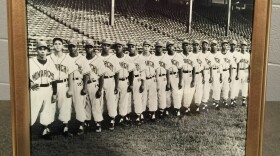
This baseball season marks 100 years since what may be the darkest moment in the history of our national pastime.
Some members of the Chicago White Sox, including the great Shoeless Joe Jackson, threw the World Series. The story has become well known through a book, and later a movie titled “Eight Men Out”, named for the number of players later banned from baseball for their roles in the gambling scheme.
But does that story match reality? New research sheds light on what took place -- and what didn’t.
Eight Men out by Eliot Asinof was published in 1963.
“We’ve learned a lot of new information in the ensuing half century,” said Jacob Pomrenke with the Society for American Baseball Research. He’s chaired a committee that has spent years studying what is known as the Black Sox scandal. The panel has put together an online project called "Eight Myths Out."
“All of these new pieces to the puzzle have helped provide definitive answers to some old mysteries and helped debunk some of the old myths,” he said.
Among them, a myth about how poorly paid the White Sox were in comparison to the other teams of the other era. Pomrenke said they have uncovered payroll records that show the
“It turns out the 1919 White Sox were among the highest paid teams in baseball,” said Pomrenke. “So the scandal was a lot more complex than disgruntled players trying to get back at the big bad boss.”
NPR Illinois' Sean Crawford speaks with Jacob Pomrenke about the 1919 Black Sox
Reality diverges from the Eight Men Out book and movie several times. Pomrenke said a story about the Sox owner Charles Comiskey maneuvering to avoid paying pitcher Eddie Cicotte a bonus is false. And there was a fabricated tale of a hit man approaching pitcher Lefty Williams on the eve of the final game of the series to threaten him.
Another incorrect point made by Asinof was that the men banned playing stayed in the shadows the rest of their lives and refused to talk about what happened.
“When Eliot Asinof went to interview some of the surviving Black Sox players, when he was researching Eight Men Out, he encountered a lot of resistance from the ballplayers. They didn’t really want to talk to him,” Pomrenke said. “Asinof attributed to their reluctance to talk to the shame they all felt about the 1919 World Series.”
But the new research uncovered more than 100 interviews given to both small and large newspapers through the years, by participants in that series. That includes both White Sox and the champion Cincinnati Reds players.
“Some of them regretted and showed remorse for what had happened and they just moved on with their lives.”

Today, we as a society look back at those players who took part in the Black Sox scandal with scorn. But Pomrenke pointed out 1919 was a different time for the sport.
“This was an era in which gamblers gathered openly in every major league ballpark. They would bet on the next pitch: strike or ball. They would bet on what the batter did. The players would provide crucial information to the gamblers to help them with their betting that day.”
Pomrenke said the owners did little to stop it. They were more concerned that the gamblers bought a ticket to get in to the game.
“The idea that the 1919 World Series was this loss of innocence for baseball doesn’t hold up to scrutiny,” he said.
Pomrenke adds the Black Sox saga remains as pertinent today, as more states open the door to legalized wagering on games.
As for what really happened in 1919, he said the new information may finally help tell the real story.
“Like many areas of history, there are a lot of compelling aspects. The truth is just as dramatic as the fictional elements that we’ve all grown up believing.”
Pomrenke and his committee will bring the discussion about the Black Sox to Illinois this September. A symposium is set for September 27-29 at the Chicago History Museum.
Copyright 2019 NPR Illinois | 91.9 UIS





